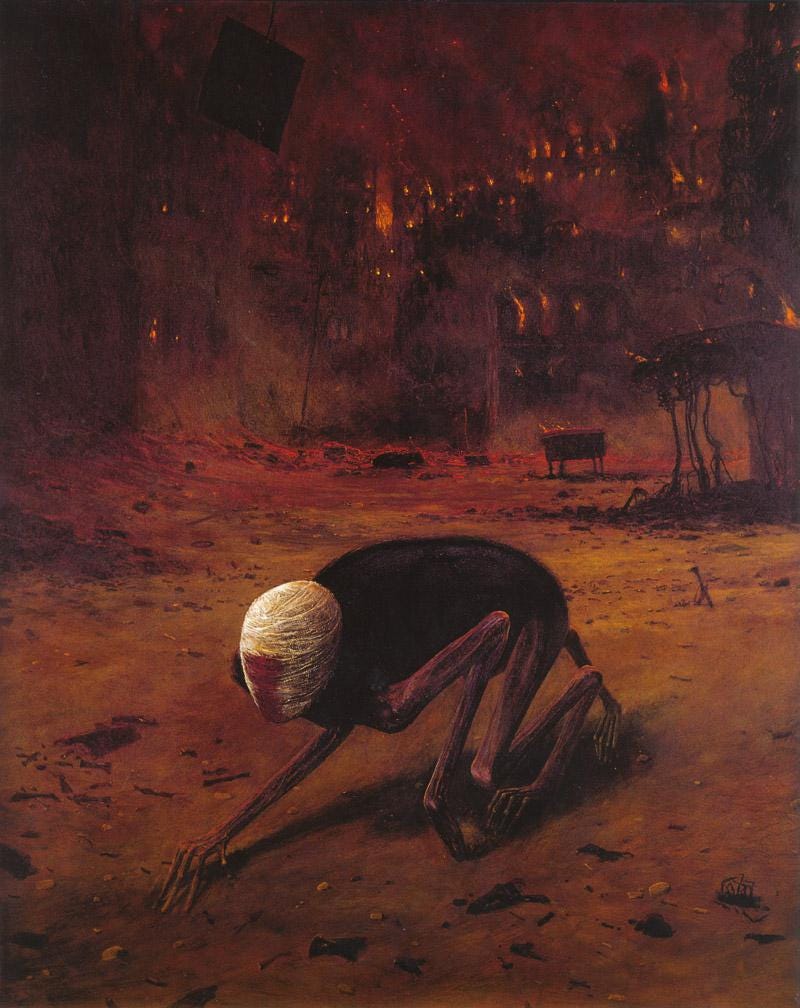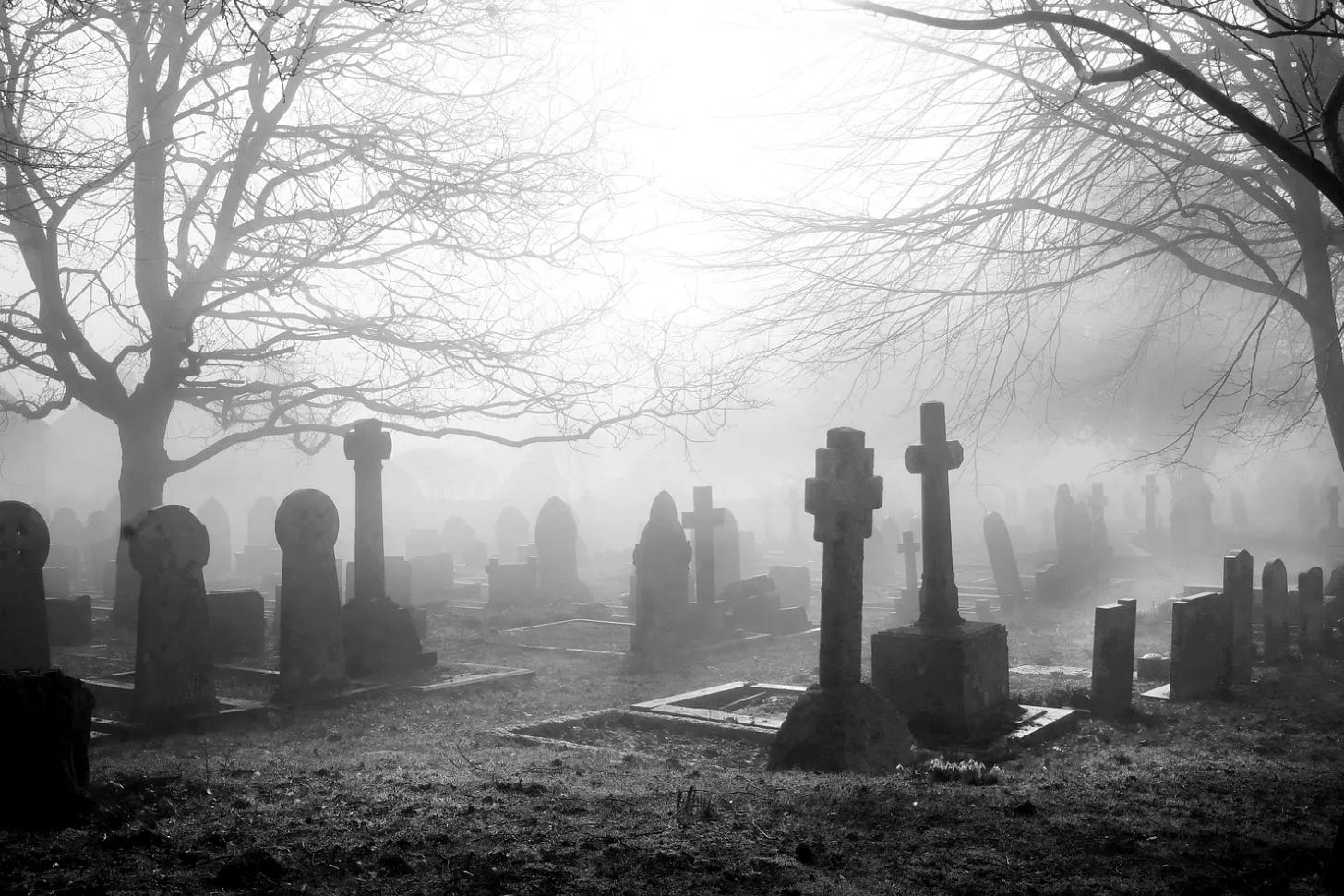Disclaimer: this is NOT an article endorsing self-harm or suicide. This article is only reflecting on change and natural death. If you are having thoughts or urges related to self-harm or suicide, please call or text the national suicide hotline.
The Oldest Fear; the Only Certainty
Death was my first fear.
I was an intelligent child, much more so than I realized at the time. If my recall is correct, I discovered concepts like solipsism and lack of free will/thought all the way back in elementary school. And I discovered death even earlier than that. I remember being maybe four years old, crying to my father that I didn’t want to die, that I didn’t want anyone I loved to die. I wished Heaven existed as the Christians said it did. My father, never one to shield me from hard truths, told me that he wished there was a Heaven too and that we didn’t have to die, but that there was no escaping it.

I don’t know what would’ve happened if he’d lied to me, but him telling the truth irrevocably changed me. I was seized by a terrible, existential fear which struck without warning. The sunlight would be streaming into our living room, and suddenly, I would remember death, remember the Reaper running ever after me, and feel cold to my core. As with all things, I learned to control my fear. I learned to turn my back to that yawning abyss—though that didn’t dispel the abyss itself. Somewhere deep inside, there is still a little me who is terrified of dying.
We all fear death. It is a major reason so many of us constantly choose to continue living despite how absurd and difficult life is. It is why we must protect our psyches with funerals and vigils. It is why we want to leave a mark on this world; something which survives us and which we are survived by.
Some say it is the management of the terror of death which gives rise to all meaning. This rings true to a degree. We are caught between the terror of death and the terror of life, and when the latter wins, we die. But evolution favors those who survive and multiply, so things which mitigate the terror of life—making meaning out of suffering, for example—would tend to be selected for. Such is the success of these drives that it is not terribly uncommon for an individual to wish for immortality; for one to wish to extend oneself or one’s legacy billions or trillions of years into the future.
Despite my fear of death, I have long been firmly against the immortality mindset. While I affirm the sanctity of life and do not wish to bring death, I believe in letting go once the time has come to do so. While I’m all for lifesaving interventions and preventing extinction risks, I am against prioritizing such things above all else. There is a certain peace in nonexistence which is belied by the frightful chasm between it and life. There are certainly many worse things than death, not least of which is life’s attachments, which lead to so much suffering.
Speaker For the Dead
“All that is dear to me and everyone I love are of the nature to change. There is no way to escape being separated from them.”
— The Fourth Remembrance
I’ve got death on the mind now because I’m moving away from Madison. It’s a place where I spent most of the past five years living and the past three years rooting myself in a community. Moving away from all that feels as close to death as I’ve felt—much closer in many ways than the few incidents of physical danger I’ve encountered. I was leaving everything and everyone I knew for a faraway place. And though I would visit them and they would visit me, it wouldn’t ever be the same.
The specter of my leaving had been there much longer. As soon as I had gotten my offer to begin a PhD, we knew exactly how numbered my days were. Whenever someone asked me where I was going, or whenever the topic strayed to the fall, a cold, ghostly presence whispered. It was like being sucked into a black hole; subtle and fleeting at first but irresistible at the last.
At the end, it felt like the time was always ticking down. Every day I was saying goodbye to someone or something. Every day I was thinking, “this will be the last time I do this.” Every day a cup was filled or a block was carved, never to revert to that state of promise and possibility. There came the moment when the last hug was given, the last tear was shed, and the last door was closed. And then it was over.
(It feels like) they never tell you how much grief the one who departs feels. The departed from must lose one person, and that is already sad. But to lose everyone and everything one loves all at once, how terrible is that? Suffice it to say that I understood more than I ever did the lament: “all my possessions for a moment in time.”

While we pretend to live in a constant world, we know that the only constant is change, sometimes slow, sometimes quick. We pretend so well that we are surprised by change, much as a parent is surprised to discover her child is six feet tall when it seemed just yesterday she stooped to hold his little hand. At what point did Achilles overtake the tortoise? Even the most learned still have no answer.
Sometimes when I look back on my memories, it feels like I’m looking back at the memories of another. Was that really me playing wall-ball at recess? Was that me curled up in anxiety before a tennis match? A lot of times, it feels like it isn’t. In that sense, I’ve already died and been reborn at least a few times.
It’s a bit sad to reflect that, for many people in my life, I have already spent a majority of the time I have with them by now. This is certainly true for my family members—as much time as I have left with them, it surely pales in comparison to the time I’ve already spent with them. We might as well start mourning each other now, and in some ways, we already have.
There’s a certain interpersonal strangeness that comes with change, because human brains aren’t quite like computers (CS nerds, feel free to correct me). There’s no clean overwriting of the old by the new; both the old person-relationship and the new person-relationship remain in existence. The old person is the one we picture when you think of that person, the unchanging Form of them, frozen in the time you left them. It is tempting to think of them as real and to think of their current self as the ghost, but that would be to get it backward. It is your memory which is the ghost and they who are the real, but you do not see that. This was always true to an extent—you are always seeing only parts of someone’s life—but it becomes more true as interpersonal distance becomes greater. To get too caught up in the Form of who someone was is to in some ways lose the remaining time you have with the reality of who they now are.
The Ultimate Dharma
“I am of the nature to die; there is no escaping death.”
— The Third Remembrance
Why leave if it’s so painful? Why let go if so much is lost?
I remember watching the final season of the Good Place (!SPOILERS AHEAD!) where Chidi says his final goodbye to Eleanor. They’ve been through so much together—so much more than even they can remember—and it’s all about to come to an end. They watch a final sunset and fall asleep together, and when she wakes up, he’s gone (she asked him to leave before she woke up, by the way). It’s one of the most beautifully touching scenes I’ve seen in any form of media.
It’s also completely irrational. What was Chidi thinking? Giving up an eternity with his awesome snacc of an afterworld-boss wife and his kickass friends for absolutely nothing? What kind of fool is he?
Clinging is so in our nature because this question is so natural and visceral while any good response requires care and patience. We are always tempted by the thought: “things are good (or at least acceptable) now; I wish they could be this way forever.” So much of who we are is built around aiming to replicate what has worked, to keep things as they are (or better, as they have been).
Indeed, change and death are in some ways some of the greatest blessings of life. Nothing lasts forever—not even suffering. What a relief that it fades away into nonexistence, rather than being eternally trapped in some horrific time crystal. Ephemerality and finitude, on balance, make suffering more bearable and well-being more meaningful.
But it’s hard to let go. There’s a part of us that wants to escape that, that wants to not have to go through that moment. Even if we know there is nothing bad after, there is something within us that screams that you will die if you take the leap. We spend so much time and will psyching ourselves up to be ready for the moment, and maybe that’s fulfilling something we need to be ready. But then the moment comes, and it’s laughably absurd how little it takes and how quickly it happens.
While I know of no science which can tell you when your time has come, I think we feel it intuitively. We sense when space to grow is growing scarce; we know when all the loose ends have been tied. To cling on ever after that would be to tarnish what came before; to take what was beautiful and precious and repeat a facsimile until it was ground down into meaningless comfort mush. To let go, to move on, to die once we are done is our ultimate dharma—collectively and individually. Being able to leave something behind with peace in your heart is the greatest of blessings. Believe me; I would know.


